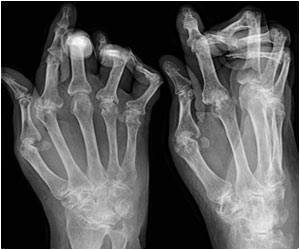Rheumatoid Arthritis is a chronic disabling disease that affects the joints, connective tissues, muscle, tendons and fibrous tissue, causing pain and deformity.

‘Not smoking and maintaining a healthy body weight - lifestyle factors which can be modified by patients - can have a significant impact on becoming symptom-free from rheumatoid arthritis (RA).’





EULAR recommendations state that remission (absent disease activity) is the target of treatment in patients with RA. However, many patients fail to achieve or maintain remission; within ten years of onset, at least 50% of patients in developed countries are unable to maintain a full-time job. "Despite the high prevalence of excess body weight and smoking among RA patients, relatively little is known about whether and to what extent these modifiable lifestyle factors impact the likelihood of achieving sustained remission," said study investigator Dr Susan Bartlett from McGill University in Montreal, Canada. "Our findings show that not smoking and a healthy body weight - lifestyle factors which can be modified by patients - can have a significant impact on becoming symptom-free."
Rheumatoid Arthritis is a chronic disabling disease that affects the joints, connective tissues, muscle, tendons, and fibrous tissue, causing pain and deformity. The prevalence of RA globally varies between 0.3% and 1% and is more common in women and in developed countries.
The independent effects of Body Mass Index class (normal weight: 18.5-24.9, overweight: 25-29.9, obese: 30+) and smoking on time to sustained remission in the first three years shortly after diagnosis were estimated in patients with early rheumatoid arthritis who had been enrolled into the large real world Canadian Early Arthritis Cohort (CATCH) study.
1,008 patients underwent follow up for three years, with disease activity (DAS28), patient-reported outcomes and medication assessed at each visit. Among males, just under one half were overweight, one third obese, and one fifth smoked. Among females, just under one third were overweight, one third obese, and 15% smoked.
Advertisement
A non-smoking female with a healthy BMI and these characteristics would have a 27% probability of achieving sustained remission within three years compared to only 10% for an obese female smoker.
Advertisement















